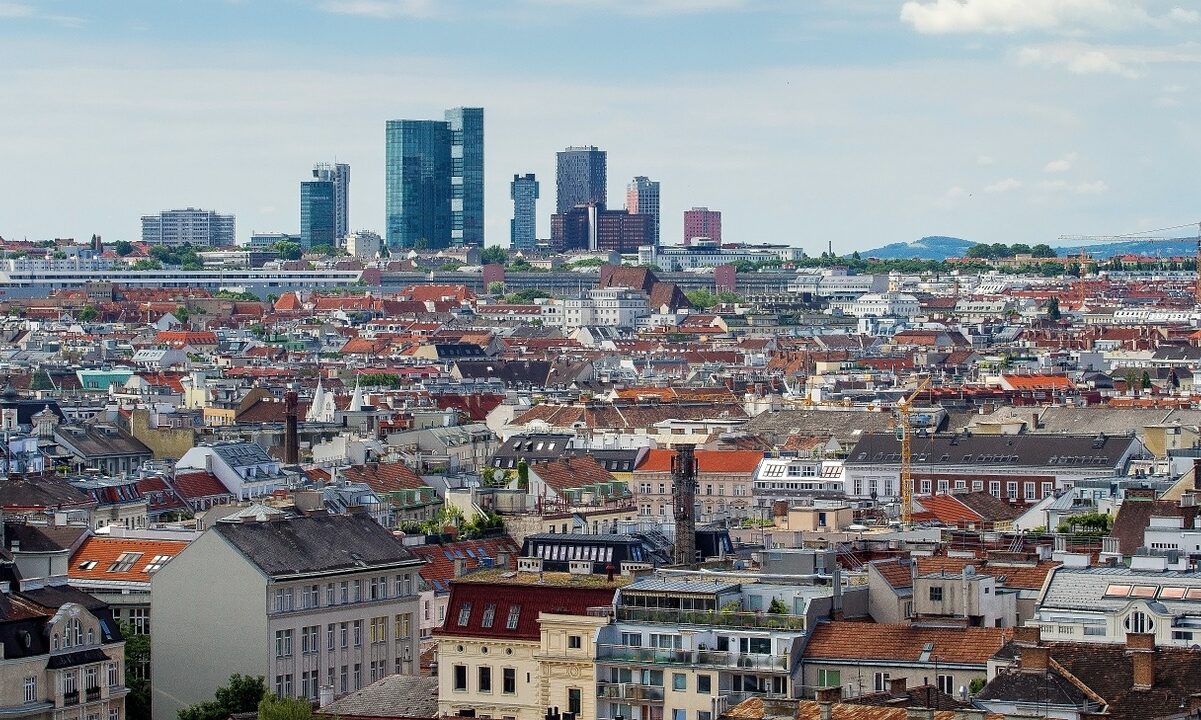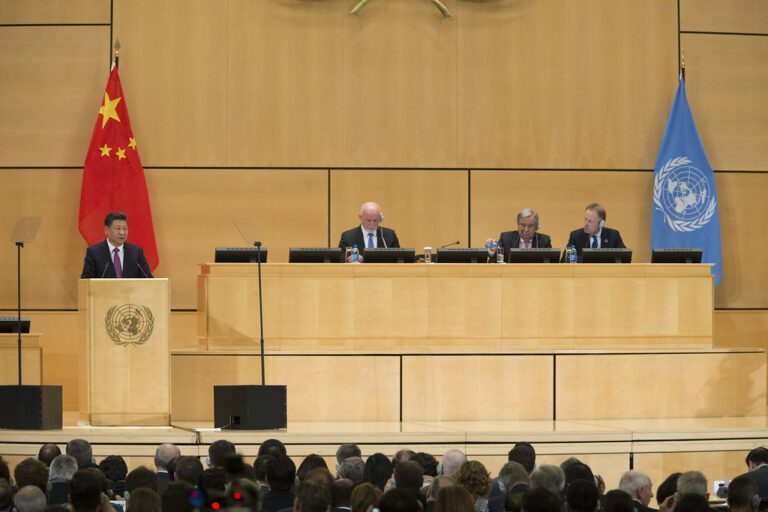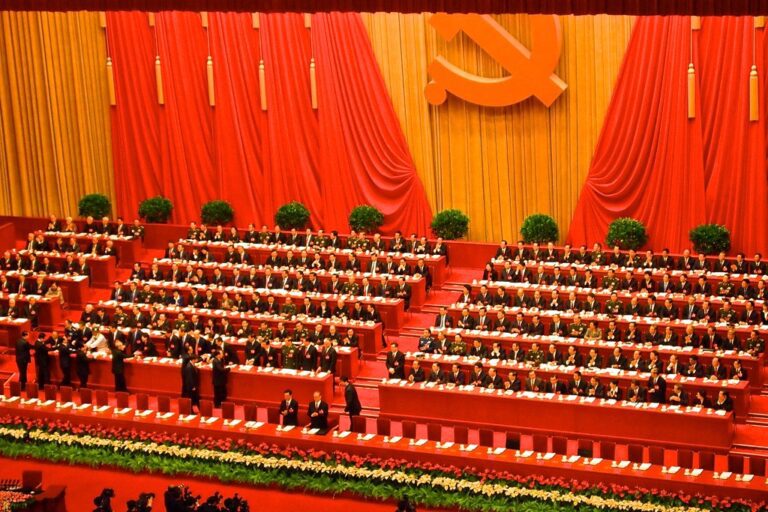How Vienna and Prague Aim to Better Understand, Inform and Integrate Chinese Diasporas

Integration authorities in the Austrian and Czech capitals reach out to local Chinese communities in promising new ways. Language barriers remain key for many first-generation diaspora members, who often feel underinformed and do not participate in local political processes.
This article is the final output of the CHOICE Visiting Fellowship of the author conducted in March-June 2024.
New Integration Efforts Regarding Chinese Diasporas in Prague and Vienna
City authorities in both Prague and Vienna are exploring new ways to reach, inform and integrate the local Chinese diaspora. Communities in both cities are growing, increasingly settle in long-term, and 1.5- (i.e. arrived as children) and second-generation diaspora members are more and more numerous. Healthy democratic systems need to convince citizens and residents of such systems’ advantages and achieve high political participation rates. If immigration is high, cities should work to quickly convince new population groups of the benefits of local participation. In order to achieve this, they need to reach and inform diaspora groups effectively, gain their trust, contribute to a feeling of belonging, and find the right interest-based arguments. Media consumption habits in Chinese diaspora communities have changed dramatically, while language barriers partially persist, which has posed additional challenges. The City of Vienna funded fresh research in 2023, with the goal of finding ways to improve communication with and the local political participation of the Chinese diaspora. Meanwhile, integration authorities in Prague have already taken steps to adjust to new trends.
This article attempts to provide a preliminary comparison of the Chinese diaspora communities in Vienna and Prague, media consumption, political participation, and the respective integration efforts of city (and partly national) authorities. It concludes by noting potential mutual lessons.
Diaspora Communities, Media Landscapes, and Local Political Participation
Diaspora communities are transnational social groups, whose lives remain connected to a region of origin. Such communities are diverse, and involve conscious decisions on how much to identify together. Connections to a region of origin can be social, cultural, economic or political, and can be very close or very loose. These groups include individuals with a short- or long-term or unclear migration perspective, and with very different reasons for migration and relations to the regions of origin and residence. Their lives are influenced both by the integration policies of their country of residence and the diaspora policies of their country of origin. Key best practice priorities for integration efforts are adequate information and “social integration through participation and civic engagement”. Particularly “political integration” is important for a sense of belonging, perceived equality, and visibility of interests and needs. Aside from elections that are only open to citizens of the country of residence, this is also about joining political parties and trade unions, chambers of commerce and industry, student politics, works councils, and forms of direct democracy at the local and national level.
One key connection to a country of origin is the regular consumption of that country’s media or “diaspora media” in the same language. Should the country of origin be an autocracy, where the government controls (almost) all media, then that government has a direct line of communication with the diaspora. Recently this has become much easier, as media consumers worldwide are switching to digital media consumption and geographical distances hardly play a role anymore. Meanwhile, diaspora media are still widely consumed, and need to be studied to understand how and which news and information reach diaspora members.
One crucial indicator on the connection to the country of residence is the level of local political participation. This is very much about whether people “who are guests” develop into people “who have settled”. Diaspora members with the citizenship of the country of residence that regularly turn out for elections, and partly even stand as candidates themselves, represent the highest level of participation. Below that level is a wide spectrum of options for less intense participation. Media consumption habits may impact the intensity of political participation individual diaspora members choose.
Chinese Diasporas Worldwide, in Vienna, and in Prague
Most of the about 60 million “ethnic Chinese” living abroad in 2014 resided in Southeast Asia, and to a lesser degree North America, Australia, and East Asia. Despite some earlier migration to the UK and France, Chinese diasporas in Europe of current size and diversification among countries of residence only developed after 1978. Sizeable communities developed (next to France and the UK) also in Italy, Germany, Spain and the Netherlands. As opposed to Chinese diasporas in Southeast Asia (and partly North America), communities in European countries typically consist almost exclusively of first-generation (arrived as an adult), 1.5-generation (arrived as a child), and second-generation diaspora members.
The Chinese diaspora in Austria is highly concentrated in Vienna, has a younger average age than other diaspora groups, and is increasingly diversified. Traditionally it consisted mostly of individuals with roots in Zhejiang Province and Fujian Province that opened up or worked in restaurants or shops. Diversification in terms of the place of origin, educational levels and field of work followed since the 1990s and early 2000s. Reliable statistics only exist for Chinese citizens and individuals who list a relevant place of birth, not for second-generation diaspora members that do not hold Chinese citizenship. At the beginning of 2024, 15,296 Chinese nationals lived in Austria, of which 8,727 lived in Vienna; 19,349 individuals in Austria listed China as their country of birth, of which 11,316 resided in Vienna. The numbers for Vienna are up from 3,063 Chinese citizens and 4,479 individuals who listed China as their country of birth in 2002. In 2020/2021, 896 Chinese students were registered at Austrian universities (most in Vienna). Asylum applications from China fell considerably from 666 in 2002 to 138 in 2022, but a much higher share was approved in recent years. For the overall size of the diaspora, including second- (and third-) generation individuals without Chinese citizenship, there are only estimates. Both Austrian and Chinese studies, and China’s Ministry of Commerce, put the overall number at a (maybe too high) 30,000 for Austria, of which more than half live in Vienna.
In the Czech Republic, the Chinese community is similarly concentrated in Prague, is relatively young, and exhibits diverse levels of education (the Czech Statistical Office provided this author with additional data). Once again, most diaspora members have their roots in Zhejiang Province and Fujian Province. Before EU accession, the Czech Republic was often a transit country for Chinese migrants, but since then the local community grew steadily. In 2022, there were 7,916 Chinese nationals in the entire country, which is up from 2,907 in 1994 and 3,421 in 2004. Of these Chinese nationals, as of early 2024, 4,120 resided in Prague, and 3,234 individuals in Prague listed China as their place of birth. Among residents with Chinese citizenship, about 26 percent listed their place of birth as Czechia, and only a handful name third countries. Among working-age diaspora members, the unemployment rate is low, at 4-5 percent. At 36 and 42 percent, tertiary education in the 20-29 and 30-39 age brackets is high, but lower for older age groups. At the same time, many in the 20-29 (23 percent), 30-39 (30 percent), and 40-49 (47 percent) age brackets did not finish any secondary education. Second-generation diaspora members may be somewhat less numerous than in Austria – statistics are again unclear or lacking – and the overall diaspora can be estimated at around 12,000 to 14,000 for the Czech Republic, of which more than half in Prague.
Media Consumption Habits in Chinese Diaspora Communities in Vienna and Prague
Members of the Chinese diaspora in Vienna overwhelmingly prefer using social media to consume news and information, while other choices depend on the diaspora generation. Insights result from 24 interviews with diaspora members of different diaspora generations, age groups, and educational levels, with varying citizenship and country of birth. First-generation diaspora members generally rely on Chinese-language sources (with exceptions among younger, more educated individuals), those in the 1.5-generation consume both Chinese- and German-language sources (and slightly prefer German), and the second-generation overwhelmingly prefers German- and English-language sources. The shift towards English mirrors trends among young Austrians without a recent migration background.
Traditional media are generally only consumed via the entry point of social media, and only in digital format (i.e. no paper, no cable or satellite TV, etc.). First- and (older) 1.5-diaspora generation members noted consuming CCTV, People’s Daily, China Newsweek, The Paper – all from the PRC and in Chinese. Among Chinese-language diaspora media, only the European Times (欧洲时报) is relevant, which sits in Paris, but has an office in Vienna for the CEE states and alpine region. Previous Chinese-language media in Austria ceased operation as traditional media. Only one, the Europe Huaxin Journal (华信报), continues as a WeChat-Account (华信传媒), and only one interviewee noted reading it.
First-generation Chinese diaspora members in Vienna all use WeChat to consume news and information (and most in the 1.5-generation), while the second-generation uses Instagram and YouTube. Every fourth or fifth interviewee among the first- and 1.5-generation also uses YouTube or Facebook. Other apps only have marginal relevance. Interviewees are part of family, friend, mum, colleague, and employer or entrepreneur groups on WeChat, where members post links to news items and information to the group. Groups often include both diaspora members residing in Austria (and other countries) and individuals in China. Interviewees also follow the accounts of official Chinese authorities, Chinese party-state media, and the European Times (欧洲时报)-account called Weicheng (维城). For the first-generation, Weicheng (维城) appears to be the dominant account for news on Austria. The account also provides translations of selected news items in German-language Austrian media, reports on selected legislative developments in Austria, and addresses Austrian political debates. Interviewees argue that social media are just more practical, all Chinese people use them (abroad and in China) (WeChat) or all young people use them (Instagram), so it is easy to connect, compare and tailor content.
Members of the Chinese diaspora in Prague – presumably of the first- and 1.5-generations – have also emphasized the importance of (local) Chinese language media, to get around the language barrier and be informed. Certain similarities with the community in Vienna can be assumed, and have been confirmed in exchanges with integration authorities in Prague. Social media are the dominant entry point for consuming news and information, regardless of diaspora generations. For the first- and 1.5-generations, those with weaker Czech language skills, and older age groups, WeChat is dominant, and Facebook has a certain secondary role. Among local diaspora media, the Prague Times (布拉格时报) is most widely read, but there are also the Czech-Chinese Journal (捷华通讯) and EC Today (今日中欧网). Moreover, the European Times (欧洲时报) may also be relevant.
The main Chinese-language media consumed by diaspora members in Vienna and Prague are either from the PRC or are diaspora media that are closely connected to the CCP or cooperate with party-state media. They are typically consumed via the censored Chinese app WeChat. In early 2024, the European Times (欧洲时报) in Vienna was published by Guang Hua Media (Austria) GmbH, which was fully owned by Guang Hua Cultures et Média in Paris, which in turn was majority owned by Zhang Xiaobei (mostly via a corporation) (Firmenbuch der Republik Österreich, FN 384801 I; Registre national des entreprises de la République Française, SIREN No.: 330 431 081). A former employee of People’s Daily, Mr. Zhang is one of the directors of Yazhou Wenhua Enterprises based in Hong Kong, which is part-owned by the CCP’s China News Service via its Hong Kong branch (Companies Registry Hong Kong, No. 80972). On its website, the European Times (欧洲时报) points out that it cooperates with China News Service, People’s Daily, China’s news agency Xinhua, CCTV, the CCP’s China Radio International, as well as with China’s embassies in Paris, London, Berlin, Rome, Madrid and Vienna. It partly reproduces the content of China’s party-state media, and its reporting on China is consistently positive. China’s Embassy to the United Nations in Vienna attributes “unique advantages” to the European Times (欧洲时报), and hopes that it will “continue to tell China’s story well”. The Prague Times (布拉格时报), meanwhile, announces on its website that it exchanges content with China News Service and several Chinese party-state media.
Local Political Participation of Chinese Diaspora Members
Chinese diaspora members’ local political participation in Vienna is limited. Interviewed first-generation diaspora members in Vienna often consume information on local elections and all other forms of political participation in Chinese. They use Chinese-language media and exchange with other diaspora members. Overall, they do not feel sufficiently informed on these matters. Meanwhile, 1.5- and second-generation diaspora members consume such information in German, and do feel well informed. Regardless of which generation, interviewed diaspora members in Vienna cannot imagine running for office; except for student politics, where 1.5- and second-generation candidates have run and been elected. Second-generation interviewees said they regularly vote in national, local, works council and student elections. Usually, they do not participate in available elements of direct democracy, do not join political parties or become active in trade unions, chambers of labor, commerce or industry.
Voter turnout among 1.5-generation interviewees with Austrian citizenship is lower, but some participated in direct democracy (e.g. petitions) and became active in the chambers of commerce and industry. As for 1.5-generation interviewees without Austrian citizenship, they generally lacked interest in these things, and do not think they would vote even if they had citizenship. Most first-generation interviewees without citizenship said they are not interested, not informed, or lack the language skills to participate, except in student politics or works council elections; two individuals said they would vote if double citizenship were possible. About half of first-generation interviewees with Austrian citizenship said they vote, and one person participated in direct democracy and at the chamber of commerce.
Chinese diaspora members in Prague are likely also limited in their local political participation.
The overall local political participation of migrants in the Czech Republic has been rather weak. This may be due partly to low naturalization rates, foreigners not being allowed to join Czech political parties, and many migrants struggling with the Czech language. This has been a major issue for the Vietnamese community as well, where many felt insufficiently informed on important legislation and the Czech healthcare and education system. For the Chinese diaspora too, the language barrier has been a key challenge. Many used to turn to communal support, interpreters or Chinese-speaking lawyers instead of local authorities (esp. outside of Prague); they feel less integrated, form less trust and less of a sense of belonging. Under such conditions, weaker political participation can be expected.
Vienna Can Learn from Prague in Effectively Informing the Chinese Diaspora
The efforts of local authorities in Vienna (and national integration authorities in Austria) to reach out to the first- and 1.5-generation diaspora in Chinese have been limited and ineffective. Interviews with diaspora members reveal that they have completely missed these initiatives – except for information on COVID-19-related measures. According to officials in City of Vienna integration and election departments, they printed election information leaflets in Chinese and gave them to large Chinese community organizations. They also put a PDF of the leaflet on a subsite of the department websites. Diaspora interviewees did not know about this. An initiative by the integration department providing “starter packages” to newly arrived migrants, “Start Wien”, does not provide Chinese-language information. Earlier cooperation with diaspora media was discontinued, and there is no cooperation with any other media to spread information in Chinese. As for social media, the integration department uses Facebook and Instagram to spread information, but not in Chinese.
Authorities in Prague have been more active and successful in reaching the Chinese diaspora. The Integration Center Prague, co-established by Prague City and the Czech government, also used leaflets in the past, putting them up in restaurants and shops. It also does not use Chinese language media to spread information. Its website, however, is available in Chinese as well. In recent years the center has also expanded its social media information activities targeted at the Chinese diaspora, and now communicates in Chinese on both Facebook and WeChat. It is active in different Chinese-language groups on Facebook used by diaspora members with roots in Mainland China or Hong Kong or Taiwan, and gets invited into a number of WeChat groups. Articles and short videos produced by the center are reposted by diaspora members on WeChat (e.g. via “Moments”), and some information is shared on official (“verified”) accounts with subscription services. The integration center uses these channels to spread information on Czech laws, integration procedures, and local healthcare, insurance and education systems (even conducting “seminars” on healthcare). Presumably, many more first-generation diaspora members are reached and well-informed than is the case in Vienna. This is very much in line with the Czech government’s integration concept considering it crucial to provide initial support in a first orientation in Czech society.
Both Vienna and Prague should aim to effectively communicate directly with diaspora members, who should feel informed, motivated to participate, and very much like they belong and are at home. The Austrian side can learn from their Czech counterparts to communicate more in Chinese, and in ways where those that have not felt addressed or included will be reached. Both cities have to be aware that Chinese-language news consumed by the diaspora communities overwhelmingly consist of PRC state media or diaspora media controlled by, dependent on and/or closely cooperating with PRC state media. First-generation diaspora members may be presented with a one-sided picture, and should be provided with content and information produced by the city authorities themselves, often for their social media accounts, including on (censored) WeChat (as far as possible). Potential negative images of (the benefits of participation in) multi-party parliamentary democracy should be counteracted. In the longer term, existing government support for minority-language media could be extended to Chinese-language media not controlled by or dependent on the PRC.
Integration authorities should look for regular direct exchange and focus groups with individuals representing different demographic groups in the diaspora. Communicating through diaspora associations and diaspora media potentially limits the diversity of views, simplifies or hides them, and reduces the knowledge gained. Meetings should make concrete problems and challenges clearer, help build trust and give the diaspora the feeling of being seen, being accepted and having arrived.
Written by
Thomas Eder
thomassederThomas Eder is a Post-Doc Researcher at the Austrian Institute for International Affairs (OIIP). He works on China's foreign and security policy, with a focus on China in the EU neighborhood, China-Russia, and China-EU relations.


